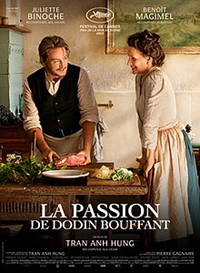The Taste of Things

Cook Eugenie and her boss Dodin have grown fond of one another over 20 years, and their romance gives rise to dishes that impress the world’s most illustrious chefs. When Dodin is faced with Eugenie’s reluctance to commit, he begins to cook for her.
Nothing matters more to Eugénie and Dodin than crafting exceptional meals, from simple omelets to the kinds of feasts that linger in memory for a lifetime. Nothing except, maybe, each other. They aren’t married, despite Dodin’s pleas over the past 20 years. Eugénie smiles enigmatically and shakes her head; she doesn’t wish to change anything. But it’s inevitable, in the end, that the autumn comes. Eugénie is not a woman to be had. She is her own self, choosing with whom and when she will share herself — generous, but, having mastered her art, someone who practices it for the pleasure of it. The fleeting nature of the culinary arts is mirrored for her in the poignant passing of the seasons. “The Taste of Things” captures the joy of variety injected into mere existence: savory and sweet, hot and sour, juice and cream and astringency are not required for pure subsistence, but the rich range of taste we have created in our daily meals says something about human longings not easily put into words. This mystery, like love, is hard to parse: Though we know loss is entwined with the feast, we choose to savor it anyhow.
